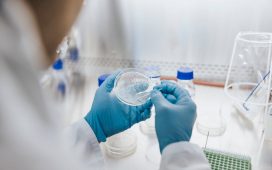A groundbreaking gene therapy has been hailed as a “medical magic wand” after the treatment transformed the lives of patients with a hereditary disorder that causes painful and potentially fatal swelling.
Patients who took part in the first human trial of the therapy experienced a dramatic improvement in their symptoms, and many were able to come off long-term medication and return to life as normal.
Dr Hilary Longhurst, the principal investigator at Te Toka Tumai, Auckland City hospital, said the single-dose therapy appeared to provide a permanent cure for her patients’ “very disabling symptoms”.
Hereditary angioedema, or HAE, is a rare disease that affects about one in 50,000 people. It is caused by a genetic mutation that leaves patients with leaky blood vessels. This produces erratic bouts of swelling that typically affect the lips, mouth, throat, bowels, hands and feet.
Attacks strike as often as twice a week and last from hours to days. People can end up bedridden if the swelling affects the bowel, and its disfiguring effect on the face can stop people leaving the home. The most serious flare-ups affect the throat and can lead to suffocation and death.
Cleveland, a 54-year-old from Suffolk who took part in the trial, has been free from attacks since having the therapy 18 months ago. “I’ve had a radical improvement in my physical and mental wellbeing,” he said. “The randomness, unpredictability and potential severity of the attacks has made trying to live my life almost impossible. I spent my life constantly wondering if my next attack would be severe.
“The swellings are painful and disfiguring. I was embarrassed to go out in case of an attack. I’ve been hospitalised with swellings on my neck and throat that have affected my ability to breathe.”
Judy Knox, a nurse in New Zealand who also took part in the trial, said the therapy was “like a medical magic wand”. Before her diagnosis, she suffered abdominal swelling with vomiting and severe pain that lasted for days. Dental work prompted dangerous swelling in her mouth, which threatened to suffocate her. “It’s changed my life,” she said.
Knox previously managed the condition with androgen medication, but supplies have not always been reliable. She is now off the medication and feels she has a “whole new life”.
HAE is caused by a mutation in the C1 inhibitor gene. When the gene stops working, people overproduce a protein called kallikrein. This drives the buildup of another protein, bradykinin, which is responsible for the leaky blood vessels and swelling.
Ten patients took part in the small phase-one trial in the UK, New Zealand and the Netherlands. Each received an infusion of “nanolipids” designed using Crispr, a Nobel prize-winning gene editing tool, to enter liver cells and knock out the kallikrein gene. The therapy stops the body overproducing bradykinin, with dramatic effects for the patients.
“It’s transforming patients’ lives,” said Dr Padmalal Gurugama, a consultant in clinical immunology and allergy at Cambridge University hospital. “My patient was having attacks every three weeks and that gentleman has not had any attacks in the past 18 months. He is not taking any medications. That is amazing.”
The results from the first patients are published in the New England Journal of Medicine, and larger trials are under way. Doctors have treated 25 more patients in a phase-two trial and hope to recruit for a final phase-three trial next year.
Despite the dramatic results, the therapy is not expected to be available soon. Beyond proving itself in remaining trials, such one-shot gene therapies are among the most expensive treatments in the world, and far from a shoo-in for the NHS.
Prof Paul Morgan, an immunologist at Cardiff University, called the results remarkable. “They demonstrate the potential to permanently cure HAE with a single treatment. Of course, larger clinical trials, encompassing the different types of HAE in different populations, are now needed,” he said.
Recent reviews had costed one-shot gene therapies at between $1m (£790,000) and $2m, meaning the treatments might only be affordable in wealthy countries, Morgan added. “Nevertheless, this study offers the real prospect of cure for some HAE sufferers.”
Dr Michael Tarzi, a senior lecturer and honorary consultant at Brighton and Sussex Medical School, was similarly impressed. “This is an outstanding application of new technology, which potentially offers a curative treatment to patients with HAE,” he said.









